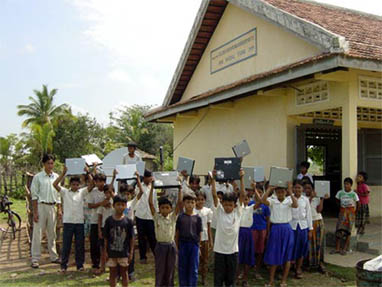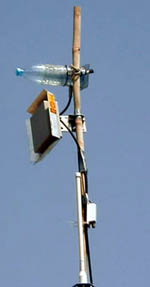The $100 laptop project – the MIT-led initiative to distribute cheap, network-enabled computers to schools throughout the developing world – is moving ahead, but it’s far from clear whether it will succeed. Today Wired discusses some of the daunting physical challenges of deploying technology in places where there isn’t even electricity, let alone a wireless broadband network. As far as energy is concerned, the MIT team is trying to make the computers as self-sustaining as possible, experimenting with hand cranks (like a wind-up watch) and “parasitic power,” where the user’s typing constantly charges the battery. Then there is the problem of networks. The vision driving the project is one of delivering the resources of the web to communities that are cut off from libraries and the general flow of information. But extending the gossamer strands of the web requires robust architecture. Dumping cheap laptops in village schools won’t achieve much if you can’t connect the dots.

![]()

Wired mentions geekcorps, a group that coordinates skilled technology volunteers around the world “to teach communities how use innovative and affordable information and communication technologies to solve development problems.” One of their trademark innovations is the “BottleNet” – a method for setting up improvised Wi-Fi relay networks with “do-it-yourself antennas,” first employed in geekcorp’s Mali project:
The do-it-yourself (DIY) antenna designs were based on information gathered from numerous sources, including standard ham radio operator reference manuals, books on building wireless community networks, numerous DIY wireless sites on the Internet, and from the past experiences of GCM volunteers with wireless antennas. Changes to the designs were made to incorporate materials that are easily available in Mali (plastic water bottles, used valve stems from motorbikes, window screen mesh, television and low cost coaxial cables, etc.) to minimize the technical skills needed to build an antenna and to reduce costs.
Something about these ad hoc creations, patched together with junk – the scraps of western industry – speaks eloquently of the fragility of our grand networked enterprise.
images: (left) kids with Panasonic Toughbooks at the Nicholas and Elaine Negroponte School in Cambodia (from Wired); (right) BottleNet antenna in Mali
